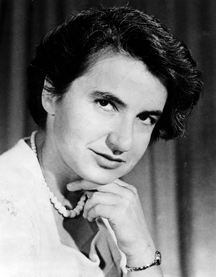Kansas City’s Metropolitan Ensemble Theatre (MET) will tell the story of the double helix’s discovery and Franklin’s contribution to it with the regional premier of “Photograph 51,” a play by Anna Ziegler that MET will present from Jan. 12 through Jan. 28.
Franklin was born in London, England, on July 25, 1920, and died at age 37 on April 16, 1958, of ovarian cancer. She showed unusual intelligence from early childhood and knew when she was 15 years old that she wanted to become a scientist at a time when girls were encouraged to aspire to a happy marriage, according to the play’s promotional material from the MET.
Franklin became a chemist and X-ray crystallographer. In 1952, she and Wilkins conceived of and photographed the double helix strand of DNA, which came to be considered one of the building blocks of life. They used X-ray diffraction to photograph DNA.
The play, which explores the complex relationships among Franklin and her male colleagues, is named after one of the photographs Franklin and Wilkins took that showed the molecule’s helical structure with particular clarity.
This photograph inspired Watson and Crick to build their model of the double helix. The four researchers’ papers on the discovery all came out in the same issue of Nature magazine in April 1953 (www.nature.com/nature/dna50/archive.html).
Watson, Crick and Wilkins were awarded the Nobel Prize for Physiology or Medicine in 1962, according to the official website of the Nobel Prize, http://bit.ly/2gTRNgP.
Karen Paisley is producing and directing the play for the MET. Several aspects of Franklin’s story intrigued Paisley and prompted her to produce the play.
“I think it’s a terrific script,” Paisley said. “We have really interesting, curious and intelligent audiences who enjoy learning and discovering, and they like interesting plays that approach complex material in non-traditional ways. Plus I think we have a really lively scientific community here, so people are just inherently curious. We’ve done several plays about science.”
Paisley said she hoped Jewish audiences would come to the play but also thought it would appeal to any audience.
“I can’t help but wonder how many people are like me and knew nothing about this woman,” she said. “Her achievements are impressive. I hope people will be truly proud as they learn more about her. The play will also be attractive to people interested in science and in current events.”
Paisley uses realism and magic realism, including leaps through time, in staging the play, and she thinks of the double helix as a metaphor for the play’s structure.
“And you can also look at this as lives that intertwine but never touch with intimacy and trust,” she said. “Because it leaps through time, it requires that we make that clear to the audience. I think that can be done with light and simple staging choices.”
Another key motivation for her choice to produce and direct the play involves the injustice she thinks Franklin suffered after her photographic discovery of the double helix’s structure because she didn’t receive proper credit for the discovery.
“She did the work,” Paisley said. “Sure, other people were on the same trail, but she held the key to what they needed to unlock the mystery of DNA, and they took it from her and never even thanked her.
“In my lifetime, until reading this play, I had never heard her name,” she said. “It’s important to know her name, and to speak it and honor her so she doesn’t disappear again. She earned her place in history. She deserves it.”
“Photograph 51”
Where: Metropolitan Ensemble Theatre, 3614 Main St., Kansas City, Missouri.
When: 7:30 p.m. Thursdays through Saturdays and 2 p.m. Sundays, Jan. 12 through Jan. 28, 2017.
Tickets: Prices range from $15 to $39. To make reservations, visit the theater’s website at www.metkc.org or call its box office at 816-569-3226.
